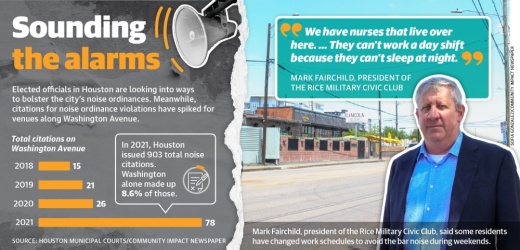In fact, Washington Avenue is considered the No. 1 problem area when it comes to violations of the city’s noise ordinance, according to Sgt. Clayton Graham with the Houston Police Department’s Differential Response Team’s Heights unit.
“Our calls for service regarding Washington Avenue for loud noise is just a constant issue out here,” Graham said in an interview. “I know the citizens are beyond fed up with it because I get all their emails.”
In response, two members of the Houston City Council, Abbie Kamin and Sallie Alcorn, are proposing amendments to the city’s noise ordinance they said they hope will work for residents and businesses alike. The Council is set to vote on the amendments at a May 4 meeting.
Kamin, who represents District C, which covers the area, said her office hears repeated complaints from residents as well. At the same time, she said she believes most bars along Washington are following the rules.
“District C is home to some of our city’s favorite bars and nightlife spots,” Kamin said in an email. “In addition to being important economic drivers, a vast majority are outstanding community partners and great neighbors. Unfortunately, the same cannot be said for a few bad-actor bars.”
The bar issue
Residents of Rice Military said they have to deal with the noise from Washington Avenue bars every week starting on Wednesday nights.
In an interview, Mark Fairchild, president of the Rice Military Civic Club, said the noise issue has become so terrible for some of his residents, they have changed their work hours to avoid being home while the commotion of the bars occurs.
“We have nurses that live over here,” Fairchild said. “They can’t work a day shift because they can’t sleep at night.”
Fairchild said residents have become so desperate to combat the noise, they have replaced windows, torn out sheet rock to put sound insulating foam in their walls and changed the room they sleep in. Despite the personal measures taken, he said residents tell him they can still feel the bass from the bars’ music in their homes.
According to public records obtained by •Community Impact Newspaper•, HPD had been called out to Washington Avenue more than 100 times since the start of the year as of March 22, including for noise complaints as well as other issues such as burglary from motor vehicles.
HPD has a loud-noise unit to patrol Washington, Graham said. Shifts are staggered with one evening shift and one night shift. The units are each a two-person job and have about four to five hours of overlap.
When responding to a service call for noise, officers use a sound meter to measure the decibels from the residential line and physically stand at the property to feel the bass. A citation is only issued if a formal complaint is made and the bar is found to be in violation of the noise ordinance.
However, some of the bars make about $10,000 to $20,000 an hour, so even when a bar is issued a citation of $1,000—the current maximum citation fee—it does not serve as an effective deterrent, Graham said.
“If we go out and write four tickets a day, that’s $4,000,” Graham said. “It’s a drop in the bucket to them. They’ve told us it’s the cost of doing business.”
Community Impact Newspaper reached out to several bars identified by residents as especially problematic during a March 17 Super Neighborhood No. 22 meeting—including Standard Bar, Clutch Bar and Heart—but did not hear back as of press time.
Revisions in progress

“We have to do something to ensure the burden is not falling unfairly on neighborhoods and law enforcement,” Kamin said.
Under the current ordinance, noise from residential properties from 8 a.m.-10 p.m. should not exceed 65 decibels. From 10:01 p.m.-7:59 a.m., the limit drops down to 58 decibels.
The three permits for loud noise that can be purchased from the city are a daily permit that can be used from 8 a.m.-10 p.m.; an extended daily permit that can be used for multiple dates from 8 a.m.-10 p.m.; and an annual permit that is valid throughout the year for Sundays through Thursdays from 8 a.m.-10 p.m. and Fridays and Saturdays from 8 a.m.-11 p.m. During those times, decibels can measure up to 75, according to the ordinance.
During an April 12 meeting of Houston’s Regulatory and Neighborhood Affairs Committee, the following proposed amendments were announced: an increase in the maximum fine from $1,000 to $2,000; the requirement of a new permit for all commercial establishments within 300 feet of a residential property playing amplified sound, which can be heard outdoors during certain hours; a revision requiring permits be given to establishments instead of individuals; and revisions to the administrative hearing process for suspension or revocation.
Alcorn said she also took bar owners’ feedback into account when crafting the ordinance. In an email, she said under the current noise ordinance, establishments can have permits revoked or suspended if they receive two or more convictions or enter two or more guilty pleas in a 36-month span.
Alcorn said with the newly proposed amendments, the hearing process would allow the affected business to present a sound mitigation plan 10 days before an administrative hearing. If the plan is approved by a hearing officer, the establishment would be allowed 90 days to implement the plan.
The administrative hearing process would be complaint driven, but complaints would not be the sole reason for a suspension or revocation of a permit, said Randy Zamora, first assistant city attorney of Houston’s legal department.
Kamin and Alcorn said they are also working closely with HPD, the Houston Fire Department, ParkHouston, the TABC and other agencies.
“This has not been an easy task,” Alcorn said at the April 12 meeting. “That is no understatement. We want to protect the right of every Houstonian to enjoy the peace and comfort of their own home. We also want a robust Houston nightlife.”
Commercial establishment permits
Among the proposals at the April 12 meeting is the creation of a new commercial enterprises permit that would be required for a “commercial establishment within 300 feet of a residence if playing outdoor amplified sound or sound that can be appreciated outside,” according to Kathryn Bruning, assistant director with Houston’s Administration and Regulatory Affairs Department.
With the new permit, Sundays through Thursdays from 10 p.m.-2 a.m., sound must not exceed 68 decibels if measured from the establishment’s property line and 58 decibels if measured from the property line of a residential home. On Fridays and Saturdays, the time period for this is 11 p.m.-2 a.m. From 2-8 a.m., amplified sound is not allowed.
Only bars, nightclubs and restaurants that will be playing music that can be appreciated outside until 2 a.m. will have to apply for this permit.
The 68-decibel limit is nothing new; however, the language was fixed as housekeeping to help HPD when they are out in the field, Alcorn’s Chief of Staff Jordan Frazier said in an interview.
After approval, the commercial establishments would have 120 days to acquire the permit. The administration office would work to educate businesses on the new proposed changes. However, the fee for the permit had not been determined as of April 12.
If a commercial business already has an annual permit, it would convert to a commercial establishment permit after the 120 days.
Residents from Washington Avenue as well as Midtown, the Museum District and the Heights spoke in favor of the proposed changes at an April 26 public comment meeting of Houston City Council. Kyle Berg, who owns McIntyre’s in the Heights, said he supported them as well.
“I think the changes will help give the city and HPD better tools to enforce noise ordinance violations as they pertain to commercial establishments playing amplified music,” he said.
Fairchild said, if the changes pass, that gives hope to Rice Military residents.
“There is some hope that some of these people might, over the course of time, get a portion of their lives back,” he said.





